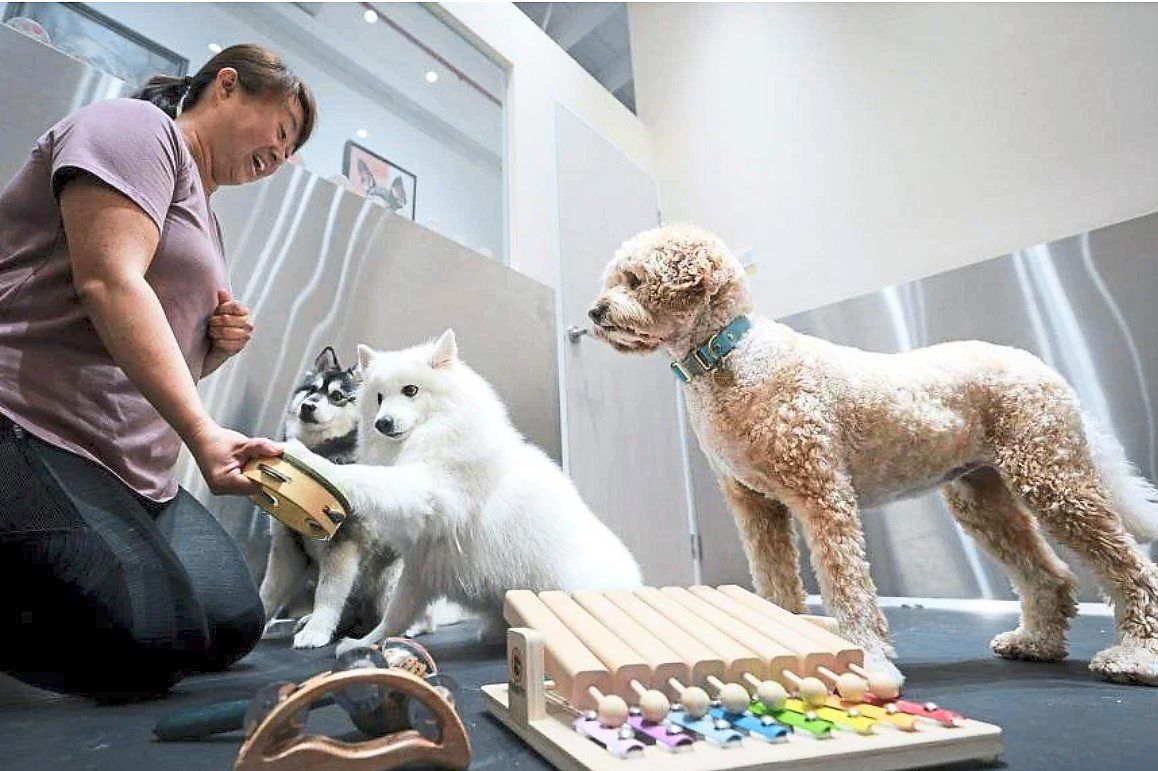Pandemic pet trends: German shepherd Bruno engaging in an outdoor activity at pet resort.
Every Wednesday, Julia Ho’s two dogs go to school, where they have enrichment lessons.
Besides their daily walks, she takes her shih tzu, Bobby, and papillon, Lola, swimming or to a doggy gym weekly.
A physiotherapist comes to their home to give the dogs a S$90 (RM298) massage once a month.
Every couple of weeks, two-year-old Bobby and three-year-old Lola do agility training, where dogs navigate a timed obstacle course made up of jumps, tunnels, weave poles and walkways.
Ho also recently signed them up for radio frequency therapy treatment, said to help with muscle recovery.
Bobby and Lola dine on home-cooked meals prepared by Ho’s domestic helper, or store-bought turmeric pork or grass-fed venison.
The fund manager, who is not married, says: “Besides wanting to give them the best to ensure their physical and mental well-being, I want to nurture them and develop their potential just like human kids, to make them happy, healthy and fulfilled.”
She bought Bobby for about S$9,000 (RM29,841) and Lola for $7,000 (RM23,209) during the pandemic and estimates that she spends more than S$2,000 (RM6,631) a month on their upkeep.
“It’s still cheaper than having kids,” she says, adding that she knows some parents who spend up to S$4,000 (RM13,262) a month on their children’s tuition and expenses.
She is among a growing breed of “paw-rents” who splurge on their “fur-kids”, fuelling the growth of the pet retail, training and care services industry in Singapore.
The industry was worth close to S$300mil in 2021, according to data from the Singapore Department of Statistics.
Boosted by the Covid-19 pandemic, new pet products and services have mushroomed recently, such as canine DNA testing and sous-vide dog food delivery.
Many of these child-free pet owners fork out for enrichment activities, similar to child development activities, such as engaging with flash cards and IQ puzzles, to ensure their fur-kids’ holistic development.
Even smaller animals are not exempt from this booming industry, which analysts attribute to “pet humanisation” – where pet owners treat their pets like children.
At least one service provider, The Grooming Angels, reports increased demand for spa treatments for dogs, cats and even guinea pigs.
A collagen spa treatment for a guinea pig costs S$40 (RM132), for example.
The rise of the pet industry started way before the pandemic, which took hold in 2020.
According to figures provided by the Singapore Department of Statistics, there were about 140 establishments involved in training and care services for pets in 2012, which almost tripled to 400 in 2021.
Operating revenue or income earned from this sector, which includes pet daycare, grooming and spa services, reached S$80.9mil in 2021, the latest figure available.
More people acquired dogs during the lonesome pandemic years.
There were about 62,000 dog licences in 2013, which inched up to 70,000 licences in 2019, the year before the pandemic. By 2022, total dog licences numbered around 87,000.
Ho, who has had pet dogs since she was a child, says the pandemic changed the way she views pets.
“It is a much closer relationship since I spent a lot of time working from home. I wanted to engage with Lola and Bobby more and bond more with them,” she says. — The Straits Times/ANN
Pandemic pet trends: German shepherd Bruno engaging in an outdoor activity at pet resort. (Right) Pawsible founder Joy Chia teaching (from left) Shadow, a pomsky, Conrad, a spitz, and Lulu, a labradoodle, how to play musical instruments. — The Straits Times/ANN






